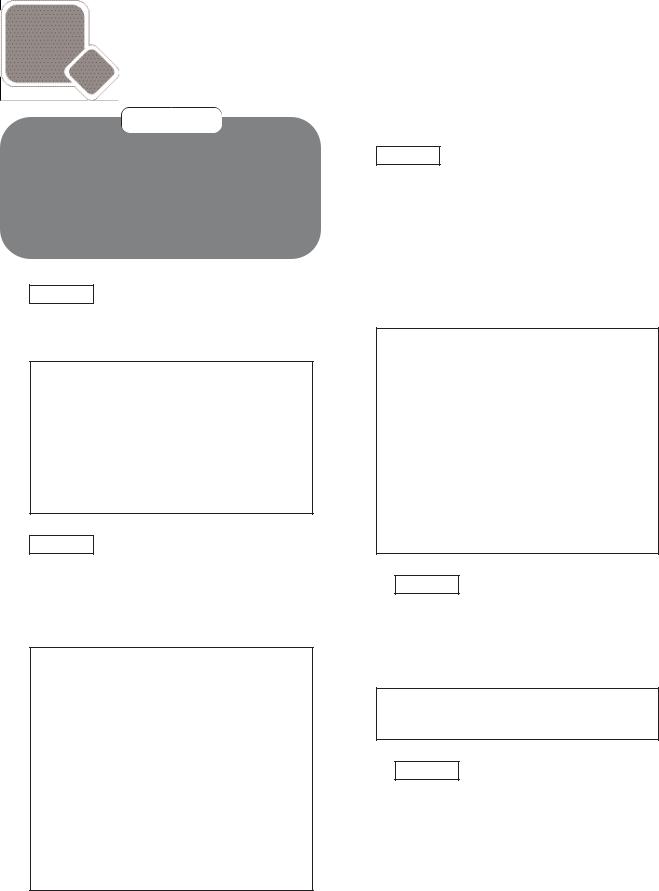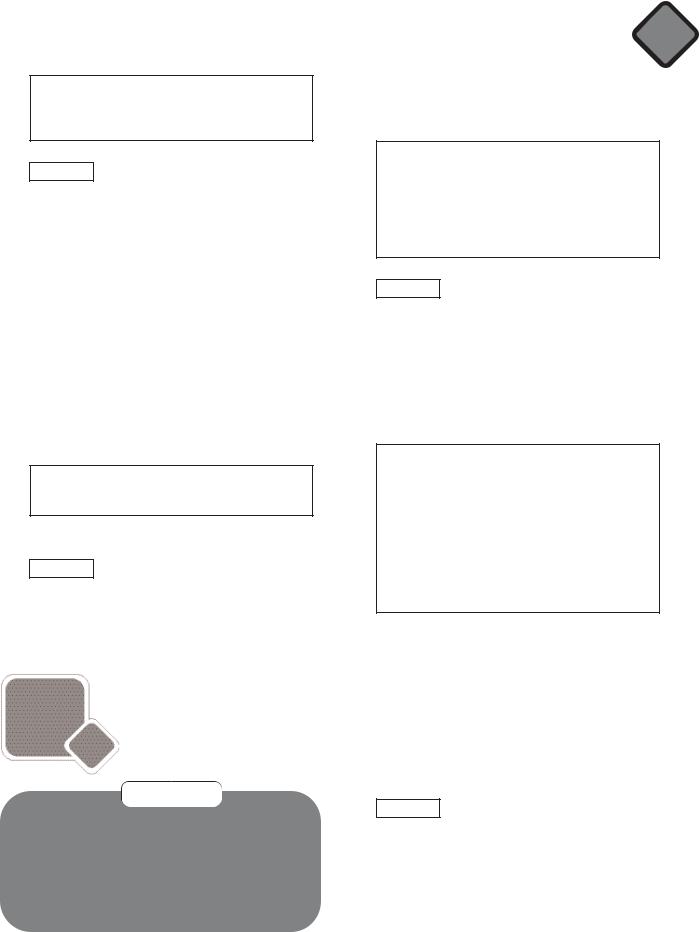
Учебники школьные / анг яз уч ответы
.PDF
5Focus Understanding new vocabulary
ñRefer Ss to the words in bold and explain that they should use the context of the text to understand their meanings and match the words with their synonyms in the list.
ñElicit answers in class and check.
Answer Key giant ― huge
residents ― inhabitants working out ― exercising lack ― shortage
strap ― fasten bumping into ― hitting
presses against ― touches block out ― shut out orbiting ― going round
stare ― look at for a long time
Vocabulary
6Focus Presenting new vocabulary related
to space
ñHave Ss complete the task individually and check their answers in the text.
ñSs choose five phrases to make sentences about the text.
ñInvite Ss to read their sentences in class and check the phrases are used correctly.
Answer Key |
|
|
|
1 |
airless |
6 |
vacuum |
2 |
space |
7 |
soft |
3 |
lack |
8 |
household |
4 |
sleeping |
9 |
pitch |
5 |
zero |
10 |
do |
|
|
|
|
Suggested Answer Key
1 The astronauts travel through airless space.
2Life is not easy on the International Space Station.
3Lack of gravity means things can float around in the spacecraft.
4Astronauts have to strap their sleeping bags to the wall.
5 Zero gravity makes muscles go soft.
6 The astronauts keep themselves clean with a vacuum hose.
Reading & Vocabulary 2a
7Their muscles go soft in space, so they have to exercise regularly.
8 Even on ISS, they still have to do household chores.
9 The station is the size of a football pitch.
10Astronauts spend a lot of time doing experiments.
7Focus Presenting new vocabulary
ñHave Ss complete the task and check their answers.
ñHave Ss make sentences about the chores they do and use adverbs of frequency in their sentences.
ñSs tell their partner their sentences. Monitor the activity and check for correct use of collocations.
Answer Key |
|
|
|
|
|
1 |
keep |
4 |
take |
7 |
hang out |
2 |
do |
5 |
mop |
8 |
dust |
3 |
make |
6 |
wash |
|
|
|
|
|
|
|
|
Suggested Answer Key
I always keep my room tidy and make my bed. I often do the washing-up. I don’t like doing it. Sometimes I take out the rubbish or dust the furniture. I never wash the clothes or hang out the washing. My mother does that. Occasionally I help make breakfast. I don’t mind helping at home as we all share the chores.
Speaking
8 a) Focus Conducting an interview
ñRead the rubric and example with Ss.
ñIn pairs have Ss conduct an interview of one of the astronauts living on the space station. Direct Ss to use the vocabulary they have learned in the unit.
ñMonitor the activity and assist as necessary.
Suggested Answer Key
B:... have food packets and a special tray that we strap to our legs so the food doesn’t float away.
A: Where do you sleep?

2a Reading & Vocabulary
B:We don’t have bedrooms but we need to strap ourselves to the walls so we don’t bump into things in the station. We also have to cover our eyes to block out the sun as it rises and sets every 45 minutes. We do, however, sleep very well in space.
A:Do you have to do any chores in the station to keep it clean?
B:There are a lot of household chores to do on the station. Bacteria grow rapidly in zero gravity so we have to clean the station everyday. It’s a big job as the station is very large. The good thing is we don’t have to have to do the washing-up or wash our clothes.
A:Do have any free time? What do you do? etc
b)Focus Consolidating information in a
text
ñHave Ss write three things that impressed them from the text and tell their partner.
ñAsk some Ss to tell the class.
Suggested Answer Key
1I was impressed with how astronauts sleep in space. It’s amazing that the sun sets and rises every 45 minutes.
2I also liked that they have to exercise as their muscles don’t work in zero gravity.
3I think it is very interesting that the astronauts have to clean the station every day as bacteria grow so fast in space.
c)Focus Discussing living in space
ñIn pairs have Ss discuss living in space.
ñEncourage Ss to use the vocabulary from the unit in their discussions.
ñMonitor the activity and assist as necessary.
Suggested Answer Key
A:I would like to live in space. It would be fun to float around in zero gravity.
B:I wouldn’t want to live in space. Everything is difficult to do in zero gravity. Also, there is too much cleaning to do on the station. I think it would be very tiring.
A:I don’t mind doing the chores and the view of Earth and the sun rising and setting every 45 minutes would be amazing.
B:I think I would miss living on Earth. It would get boring floating all the time.
A:Maybe, but then there would be so many things to do. etc
Writing
9Focus Writing a leaflet giving instructions
ñRead the rubric aloud and check Ss understand the task.
ñExplain that the leaflet is giving instructions explaining and describing living on Earth to people who have never lived here.
ñAllow Ss time to write their leaflets. Alternatively, assign the task as HW.
ñInvite Ss to read their leaflets in class and ask for feedback from the class.
Suggested Answer Key
... in front of you.
Also, you don’t have to sleep in a sleeping bag or strap yourself down for the night. Just lift up the covers on the bed and get in between the sheets to sleep.
You’ll love being able to have a hot shower without a vacuum hose. You can relax under the water spray and none of the droplets will float away.
You don’t have to exercise for two hours a day to keep your muscles from going soft. Have a break and relax a bit by only doing some light exercise instead of the more strenuous workouts you are used to!
You’ll have to tidy up after yourselves though and that means doing the chores like the washing-up and putting your rubbish in the bin.
Your free time can be spent any way you like but you’ll probably want to spend as much time outdoors as you can rather than being stuck indoors all the time.
Enjoy your stay on Earth!
34

2 b Listening & Speaking
Objectives
Vocabulary: idioms related to houses
Reading: reading for coherence and cohesion Listening: listening for intonation; listening for confirmation; listening for specific information Speaking: role playing; criticising/apologising; expressing anger/annoyance
1Focus Describing a picture
Refer Ss to the picture and elicit answers to the questions in the rubric.
Suggested Answer Key
The people in the picture are sitting at a table enjoying a meal. They may be in a restaurant. They seem to be a family. The mother and the daughter are talking and smiling so they must be happy and the father and the son are listening so they must be interested in what is being said.
2Focus Describing family behaviour at home
ñRead through the sentences and check Ss understand the vocabulary.
ñElicit which people in Ss’ families do the things described in the sentences.
Suggested Answer Key
1 My sister never gets off the phone.
2 My brother is always taking things without asking.
3 My brother never helps around the house.
4My grandmother never switches off the lights.
5 My dad always leaves things everywhere.
6 I never tidy up.
7 My brother plays loud music.
8 My dad doesn’t let me stay out late.
9 My mum is always there for me.
10 My sister helps me with my homework.
Everyday English
3Focus Role playing (criticising and
apologising)
ñRead through the expressions in the language box and check Ss understand them.
ñRefer Ss to the example exchange.
ñIn pairs Ss role play criticising and apologising for the behaviour in the sentences.
ñMonitor the activity and check for the correct use of the expressions.
Suggested Answer Key
2A: You get on my nerves when you never turn off the lights.
B:I am sorry. I didn’t realise it annoyed you.
3A: I can’t stand it when you never let me watch what I want on TV.
B:Sorry!
4A: You always play your music really loud. You drive me crazy.
B:Please forgive me. I didn’t mean to upset you.
4a) Focus Predicting the content of a dialogue
ñHave Ss read out the sentences and check they understand them.
ñElicit from Ss what they think the dialogue is about.
Suggested Answer Key
The dialogue is about household chores.
b) Focus Reading for coherence and cohesion
(missing sentences)
ñExplain the importance of reading through the dialogue first with the gaps to gain an overall idea of the text structure and content. Emphasise the importance of looking at the sentences before and after each gap to make sure the chosen sentence makes sense in that context.
ñSs complete the task.
ñPlay the recording. Ss listen and check their answers.
35

2b |
|
Listening & Speaking |
|
|
|
|
|
|
|
|
|
|
|
Answer Key |
|
|
1 |
B 2 E 3 A 4 D 5 F |
|
|
|
|
|
5Focus Matching phrases/expressions
ñHave Ss complete the task individually.
ñRead out the statements and elicit the synonymous phrases from the dialogue.
Answer Key
ñLook at the mess in your bedroom. ― Just look at the state of your bedroom.
ñI want to talk to you. ― I’d like a word with you.
ñIt’s not my job to do everything for you.
― I’m not your slave, you know!
ñWhat can I do to say sorry? ― How can I make it up to you?
ñYou’re right about that. ― you’ve got a point there
ñhelp you ― give you a hand
6Focus Practising a dialogue
ñHave Ss in pairs read out the dialogue twice (once in each role).
ñMonitor the activity and assist as necessary.
Speaking
7Focus Role playing a dialogue (criticising
and apologising)
ñRead the rubric with Ss and check they understand the situation.
ñDirect Ss to use expressions and vocabulary they have learned from the unit.
ñIn pairs, Ss act out their dialogues and record themselves.
ñSs listen to their recordings and discuss.
ñMonitor the activity and assist as necessary.
Suggested Answer Key
A:Jack, I’d like a word with you.
B:What have I done now?
A:Just look at the state of my bedroom. You’ve been in and messed it up and my friend Sarah is coming over this afternoon. You shouldn’t have done that. It’s not very nice.
B:I’m sorry. How can I make it up to you?
A:You can start by tidying up this mess.
B:OK.
A: Thank you.
36
Intonation
8Focus Listening for and practising
intonation for expressing anger and annoyance
ñRemind Ss that intonation is the way your voice rises and falls as you speak. It is used to emphasise certain words and phrases.
ñSs listen to the recording and complete the task individually.
ñPlay the recording with pauses and check Ss’ answers.
ñInvite Ss to repeat the sentences and check for correct intonation.
Answer Key
•Oh, Mum!
•Come here, young man!
•Just look at this mess!
•I’ve just about had enough!
•That’s what you always say!
•You treat this place like a hotel!
•I’m not your slave, you know!
Say it right
9Focus Understanding everyday exchanges
ñHave Ss complete the task individually.
ñSs then listen to the recording and check their answers.
Answer Key
1 a |
2 b |
3 a |
Listening
10 Focus Listening for specific information
(multiple choice)
ñHave Ss read through the statements and underline the key words to prepare themselves for the listening task.
ñPlay the recording and Ss complete the task individually.
ñPlay the recording again and Ss check their answers.
Answer Key |
|
|
|
|
||
1 |
B |
3 |
A |
5 |
A |
7 B |
2 |
C |
4 |
C |
6 |
C |
|
|
|
|
|
|
|
|

|
|
|
|
Listening & Speaking |
2b |
|
|
|
|
|
|
|
|
|
|
|
ñ In pairs Ss read each other their sentences. |
|||
11 |
Focus |
Presenting idioms related to houses |
||||
|
|
|
ñ Monitor the activity and check Ss use the |
|||
|
|
|
||||
|
|
|
|
phrases correctly. |
||
|
|
|
|
|
|
|
|
|
|
|
Suggested Answer Key |
||
1 I can’t stand it when you play loud music. 2 You drive me crazy when you leave your
thing everywhere.
3 I’m so sorry. I didn’t realise it bothers you. 4 Can I give you a hand with the washing-up. 5 My best friend and I get on like a house on
fire.
6 Just look at this mess! Can’t you tidy up your room?
7 I have just about had enough of your loud music!
|
2 c |
Grammar in Use |
||||||
|
|
|
Objectives |
|
|
|
|
|
Grammar: infinitive/-ing forms; too ― enough |
|
ñ kind/sad/lucky/clever/glad, etc + to-infinitive |
|
|||||
|
(examples: they are always glad to) |
|
||||||
Reading: reading for specific information; |
|
|
||||||
|
ñ manage/want/expect/offer/help/promise, |
|
||||||
reading for grammatical correctness |
|
|
||||||
|
etc + to-infinitive (examples: the only one |
|
||||||
|
|
|
|
|
|
|
||
|
|
|
|
|
|
who wants to, vacuuming ... helps to get |
|
|
|
|
|
|
|
|
rid of, don’t expect to get rid of) |
|
|
1 |
Focus |
Presenting the infinitive/-ing forms |
|
|
||||
|
ñ let/make/hear/see/feel + infinitive without |
|
||||||
ñ Elicit the forms of the infinitive from Ss. |
|
|
||||||
|
to (examples: don’t let them live) |
|
||||||
ñ Have Ss fill in the grammar box. |
|
|
|
|
||||
|
|
|
|
|||||
ñ Ask Ss to read the text to find examples. |
2 |
|
Practising expressions/phrases with |
|||||
ñ Tell Ss to check their answers in the Grammar |
Focus |
|||||||
|
Reference section. |
|
infinitive/- |
ing forms |
||||
|
|
|
|
|
||||
|
|
|
|
|
ñ Read through the phrases and check Ss understand |
|||
|
Answer Key |
|
|
|
them. |
|||
|
ñ like/love/prefer/don’t mind/can’t stand, |
|
ñ Have Ss read the text again and write |
|||||
|
etc + -ing form (examples: dust mites like |
|
|
sentences about the insects using the phrases. |
||||
|
eating, they can’t stand living) |
|
ñ Remind Ss to use the correct form of the |
|||||
|
ñ can/must/may/will, etc + infinitive without |
|
|
infinitive in each sentence. |
||||
|
to (examples: you may think, they can carry, |
|
ñ Invite Ss to read out their sentences in class |
|||||
|
cockroaches can live) |
|
|
and check. |
||||
|
ñ look forward to/have difficulty (in)/be |
|
|
|
|
|
||
|
used to, + -ing form (examples: they have |
|
|
|
|
|
||
|
difficulty laying) |
|
|
|
|
|
||
|
|
|
|
|
|
|
|
|

2c Grammar in Use
Suggested Answer Key
You will have difficulty in getting rid of cockroaches.
Cockroaches are glad to live in warm and dark places.
Dust mites like eating dead skin. Cockroaches can carry diseases.
Don’t let your room get too warm as bedbugs lay eggs in warm temperatures.
Don’t expect cockroaches to die immediately.
3Focus Reading for grammatical correctness/
Practising infinitive and -ing forms
ñHave Ss complete the task individually.
ñInvite Ss to read out the quiz in class to check their answers. Write your own answers to the quiz on the board. Compare your results with Ss’.
Answer Key |
|
|
|
|
|
1 |
to get on |
5 |
playing |
9 |
having |
2 |
to help |
6 |
do |
10 |
to do |
3 |
doing |
7 |
borrow |
|
|
4 |
helping |
8 |
asking |
|
|
|
|
|
|
|
|
(Ss’ own answers)
4Focus Understanding differences in meaning
of verbs in infinitive and -ing forms
ñHave Ss complete the task individually.
ñSs compare their answers with a partner and discuss the differences in meanings between the infinitive and -ing forms of verbs.
ñSs check their answers in the Grammar Reference section.
Answer Key
1a) switching (recall)
b)to switch (not forget)
2a) drinking (do sth as an experiment)
b)to open (made an attempt)
3a) watching (finished action)
b)to watch (interrupted what she was doing in order to do sth else)
4a) talking (without stopping)
b)to talk (proceeded)
38
5Focus Practising infinitive and -ing forms
ñHave Ss complete the exchanges.
ñInvite Ss to read the exchanges aloud in pairs and check their answers .
Answer Key |
|
|
|
1 |
A: to go |
4 |
A: to tell |
|
B: staying |
|
B: worrying, to wait |
2 |
A: to do |
5 |
A: fix |
|
B: doing |
|
B: calling, fixing |
3 |
A: to turn off |
|
|
|
B: turning |
|
|
|
|
|
|
6Focus Forming sentences with infinitive and
-ing forms
ñRead through the list of verbs and actions.
ñHave Ss make up sentences about themselves using them.
ñInvite Ss to say their sentences in class and check for the correct use of infinitive and -ing forms.
Suggested Answer Key
I hate helping with the housework. I enjoy listening to music.
I look forward to going shopping tomorrow. I can’t stand travelling by train.
I can’t tidy my room today.
I will visit my aunt on Sunday.
My parents let me stay out late on Saturdays. I don’t mind walking the dog.
I want to become a teacher. I like watching TV.
7Focus Consolidating the uses of infinitive/
-ing forms
ñHave Ss complete the sentences individually.
ñSs compare their answers with a partner.
ñMonitor the activity and check for the correct use of infinitive and -ing forms.
Suggested Answer Key
2 I avoid tidying my room.
3 I can’t stand washing the dishes.
4 I usually avoid studying in my room.
5 I try to help my brother with his homework. 6 I don’t mind taking out the rubbish.
7 I can’t help playing video games.
8I’d rather go to a friend’s house than stay at home.

9 I hate helping with the gardening.
10It’s not worth arguing with my brother; I never win.
Grammar in Use 2c
ñHave Ss complete the task individually.
ñRead out the answers in class and check.
ñAs an extension, ask Ss to justify their answers.
Answer Key
1 talking (part of action)
2 run (completed action)
3 singing (part of action)
4 drawing (part of action)
5 delivering (part of action)
10Focus Presenting too ― enough
ñRead the grammar box with Ss and check they understand the difference between too and enough.
ñHave Ss complete the task individually and check their answers with a partner.
ñInvite Ss to read their sentences in class and check.
Answer Key
2 James is clever enough to solve this problem.
3I have enough money to buy this expensive watch.
4They were too tired to stay awake during the film.
5 We’ve got enough food to give you some.
6He spoke too fast for me to understand him.
2 d Vocabulary & Speaking
Objectives
Vocabulary: related to towns/villages; neighbours Reading: reading for coherence and cohesion Listening: listening for specific information Speaking: role playing exchanges between neighbours
Writing: describing a good neighbour
1Focus Presenting new vocabulary/
Describing where you live
ñRead through the phrases and elicit similar ones in Ss’ L1.
ñInvite Ss to use the phrases to talk about where they live to the class.
ñCheck Ss understand the vocabulary.

2d Vocabulary & Speaking
Suggested Answer Key
I live in a large town. There are attractive modern houses and flats. The streets are narrow and noisy. There are lots of big, expensive shops that are always crowded. There aren’t a lot of small local shops. I live in a spacious, comfortable flat on a noisy street.
2Focus Listening for specific information/
ñRead the rubric with Ss.
ñPlay the recording and have Ss complete the task individually.
ñElicit answers in class and play the recording to check.
Answer Key
It has wide, clean streets and attractive, modern houses. There’s a small supermarket, a post office, a bank and a chemist’s.
3Focus Practising prepositions of place
ñExplain that the prepositions in the list are prepositions of place and indicate where something is located.
ñInvite two Ss to the front of the class and read through the list of prepositions. Ask the two Ss to demonstrate the correct positions indicated by the prepositions. (e.g. One S stands in front of the other to demonstrate ‘in front of’.)
ñInvite Ss to describe their neighbourhood to the class using the prepositions and places.
ñCheck for the correct use of prepositions.
Suggested Answer Key
My neighbourhood is big and crowded. I live in a modern flat on a noisy street. My block of flats is behind a large supermarket. Next to the supermarket is a large park. Opposite my flat is a newsagent’s and there is a bank next to that. On the corner is a busy restaurant. In front of my flat is a bus stop.
4 a) Focus Understanding adjectives
ñHave Ss complete the task individually and compare their answers with a partner.
ñElicit answers in class and discuss the meanings of the adjectives.
Answer Key
positive: sociable, helpful, caring
negative: selfish, rude, arrogant, forgetful, talkative, silly, easily annoyed, nosy
b)Focus Consolidating the use of adjectives
ñIn pairs Ss describe their neighbours using the adjectives from Ex. 4a.
ñDirect Ss to justify their descriptions.
ñMonitor the activity and check Ss understand the adjectives.
Suggested Answer Key
My neighbour across the street, Mr Brown, is very caring. He brings us fresh fruit when we are ill.
Mr Jones, my neighbour on the corner of my street is easily annoyed and complains whenever we make any noise.
My neighbour across from my block of flats is very nosy and watches us from her window. etc
5Focus Reading for coherence and cohesion
(missing sentences)
ñExplain to Ss the importance of first reading through the text with the gaps to gain an overall idea of the text structure and content. Emphasise the importance of looking at the sentences before and after the gap to make sure the chosen sentence makes sense in that context.
ñSs complete the task individually.
ñInvite Ss to read out the text in class and check their answers.
Answer Key |
|
|
|
|
|
1 |
F |
3 |
A |
5 |
E |
2 |
D |
4 |
G |
6 |
B |
|
|
|
|
|
|
6Focus Understanding everyday exchanges
ñIn pairs have one S read the question or statement and the other S find the response.
ñRead out the exchanges in class and check.
Answer Key
1 c |
2 d |
3 a |
4 e |
5 b |
40

|
|
|
|
Vocabulary & Speaking |
|
2d |
|||
7 |
|
Role playing exchanges between |
|
|
|
|
|
||
|
|
|
|||||||
Focus |
|
4 A: Would you like me to do your shopping |
|
||||||
|
|
|
|
|
for you when I’m at the supermarket? |
|
|
||
|
|
|
|
|
B: That’s really kind of you. Thank you. |
|
|
||
|
|
|
|
|
|
|
|
|
|
|
|
|
|
|
|
Describing a good neighbour |
|
|
|
8 |
|
Focus |
|
|
|||||
|
|
|
|
ñ Allow Ss time to write a few sentences describing |
|||||
|
|
|
|
|
a good neighbour. |
|
|
||
|
|
|
|
ñ In pairs, have Ss read each other their |
|||||
|
|
|
|
|
sentences and discuss. |
|
|
||
|
|
|
|
ñ Monitor the activity and assist as necessary. |
|
|
|||
|
|
|
|
|
|
|
|
|
|
|
|
|
|
|
Suggested Answer Key |
|
|
||
|
|
|
|
|
A good neighbour is someone who cares about |
|
|||
|
|
|
|
|
people and offers to help them whenever |
|
|||
|
|
|
|
|
he/she can, such as doing little errands. A |
|
|||
|
|
|
|
|
good neighbour is considerate and doesn’t do |
|
|||
|
|
|
|
|
things which may disturb his/her neighbours |
|
|||
|
|
|
|
|
such as playing loud music late at night. A |
|
|||
|
|
|
|
|
good neighbour is friendly, sociable and helps |
|
|||
|
|
|
|
|
people who live near them to feel part of a |
|
|||
|
|
|
|
|
community. |
|
|
||
|
|
|
|
|
|
|
|
|
|
|
|
|
|
(Ss’ own answers) |
|
|
|||
|
|
|
|
|
|
||||
2 e Writing Skills
Objectives
Grammar: direct/indirect questions
Writing: writing an informal email/letter
1Focus Matching introductions and
conclusions in informal letters/emails
ñRead the theory box about informal letters/ emails with Ss and check that Ss understand it.
ñSs read the beginnings and endings of the letters individually and complete the task.
ñElicit answers in class.
Answer Key
1 |
D |
thank-you letter |
2 |
A |
accepting an invitation |
3 |
C |
asking for advice |
4 |
E |
get-well-soon letter |
5 |
B |
letter of invitation |
2 a) Focus Analysing a rubric
ñHave Ss read the rubric and answer the questions.
ñElicit Ss’ answers in class and explain that the underlined information tells them what to write.
Answer Key
1I am writing to my English-speaking penfriend Richard.
2I should tell him what my house is like, how much time I spend in my room and what there is to do in my area for entertainment.

2e |
|
|
|
Writing Skills |
|
|
|
|
|
|||
|
|
|
|
|
|
|
|
|
||||
|
|
|
|
|
|
|
|
|
|
|
|
|
|
|
|
|
Focus |
Understanding the structure and |
|
Answer Key |
|
||||
|
|
|
|
content of |
an informal letter |
|
direct questions |
|
||||
|
|
|
|
|
|
|
|
|
|
|||
|
|
|
ñ Have Ss read the letter. |
|
2 |
How was your summer holiday? |
|
|||||
|
|
|
ñ Elicit in class the structure of the letter and |
|
3 |
What do you do in your free time? |
|
|||||
|
|
|
|
if all the information asked for was given. |
|
4 |
How many brothers and sisters have you |
|
||||
|
|
|
|
|
|
|
|
|
|
got? Is your family big or small? |
|
|
|
|
|
|
|
|
|
|
|
|
|
|
|
|
|
|
Answer Key |
|
|
indirect questions |
|
|||||
|
|
|
Para 1: opening remarks |
|
|
|
||||||
|
|
|
|
|
2 |
Can you tell me about your summer |
|
|||||
|
|
|
Para 2: what his house is like and whether he |
|
|
|
holiday? |
|
||||
|
|
|
spends much time in is room |
|
|
3 |
I’d like to know what you do in your free |
|
||||
|
|
|
Para 3: what there is to do for entertainment |
|
|
|
time. |
|
||||
|
|
|
in his area |
|
|
4 |
Can you tell me how many brothers and |
|
||||
|
|
|
Para 4: closing remarks |
|
|
|
sisters you’ve got? Can you tell me whether |
|
||||
|
|
|
Yes, the writer has included all the information |
|
|
|
your family is big or small? |
|
||||
|
|
|
|
|
|
|
|
|
||||
|
|
|
needed. |
|
|
|
|
|
|
|||
|
|
|
|
|
|
|
|
|
|
Analysing rubrics/Identifying key |
||
|
|
|
|
|
|
6 |
|
Focus |
||||
|
|
|
|
|
|
|
||||||
|
|
|
|
|
|
|
|
|
words |
|
|
|
3 |
|
Focus |
Understanding informal writing style |
|
|
|
||||||
|
ñ Have Ss read the rubrics individually and |
|||||||||||
|
ñ Read the theory box aloud and elicit examples |
|||||||||||
|
|
|
underline the key words. |
|||||||||
|
|
|
of informal style from the model letter in |
|
|
|||||||
|
|
|
ñ Elicit answers to questions in the rubric in class |
|||||||||
|
|
|
Ex. 2b. |
|||||||||
|
|
|
|
|
and discuss. |
|||||||
|
|
|
|
|
|
|
|
|
|
|||
Answer Key
everyday phrasal verbs: hang out idioms: drop me a line
informal linkers: and
short forms: it’s, there’s, that’s
4Focus Understanding direct/ indirect
questions
ñRead the theory box with the class and elicit the answer to the question in the rubric.
ñAsk Ss to think up their own direct and indirect questions and say them in class to check.
Answer Key
In a direct question the verb is in the interrogative, that is the verb comes before the subject. e.g. What did Ken say?
In an indirect question the verb is in the affirmative, that is the verb follows the subject. e.g. Do you know where Catherine is?
5Focus Practising direct and indirect
questions
ñHave Ss write direct and indirect questions for the situations in the rubric.
ñElicit answers in class and check.
Answer Key
A You have received a letter from your English-speaking pen-friend Peter.
…Hope you had a great summer. What did you do? Did you have a good time? It’s my birthday next week and I can’t wait!...
Write him a letter and answer his questions, then ask him about his birthday plans.
1 a letter giving news and asking for information
2 my English-speaking pen-friend Peter
3 what I did in the summer
4Are you having a party? What present would you like? Will you have a birthday cake?
B You have received an email from your English-speaking pen-friend Robert.
…I hope you had a safe journey home. It was great spending time together. I hope you will come and visit again soon....
Write him an email to thank him and his family for their hospitality, then invite him to stay with you.
42
